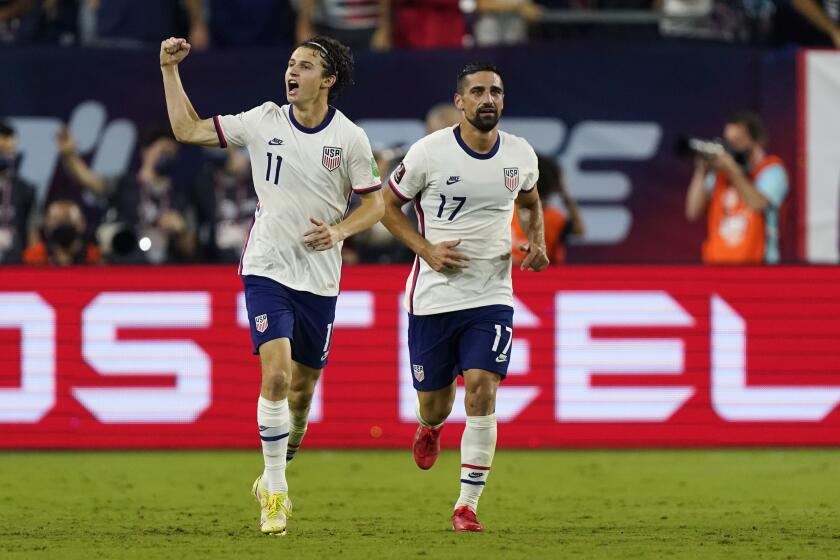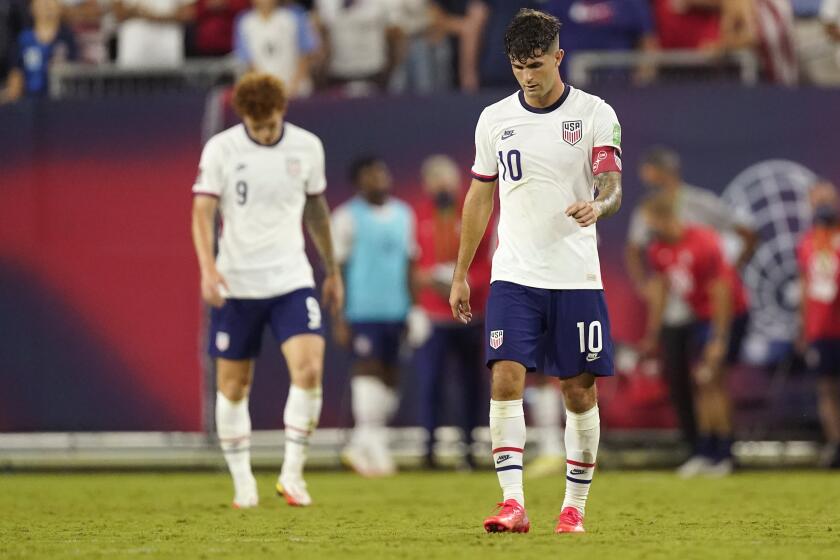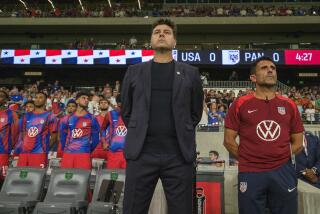U.S. soccer beats Honduras to secure first victory in World Cup qualifying
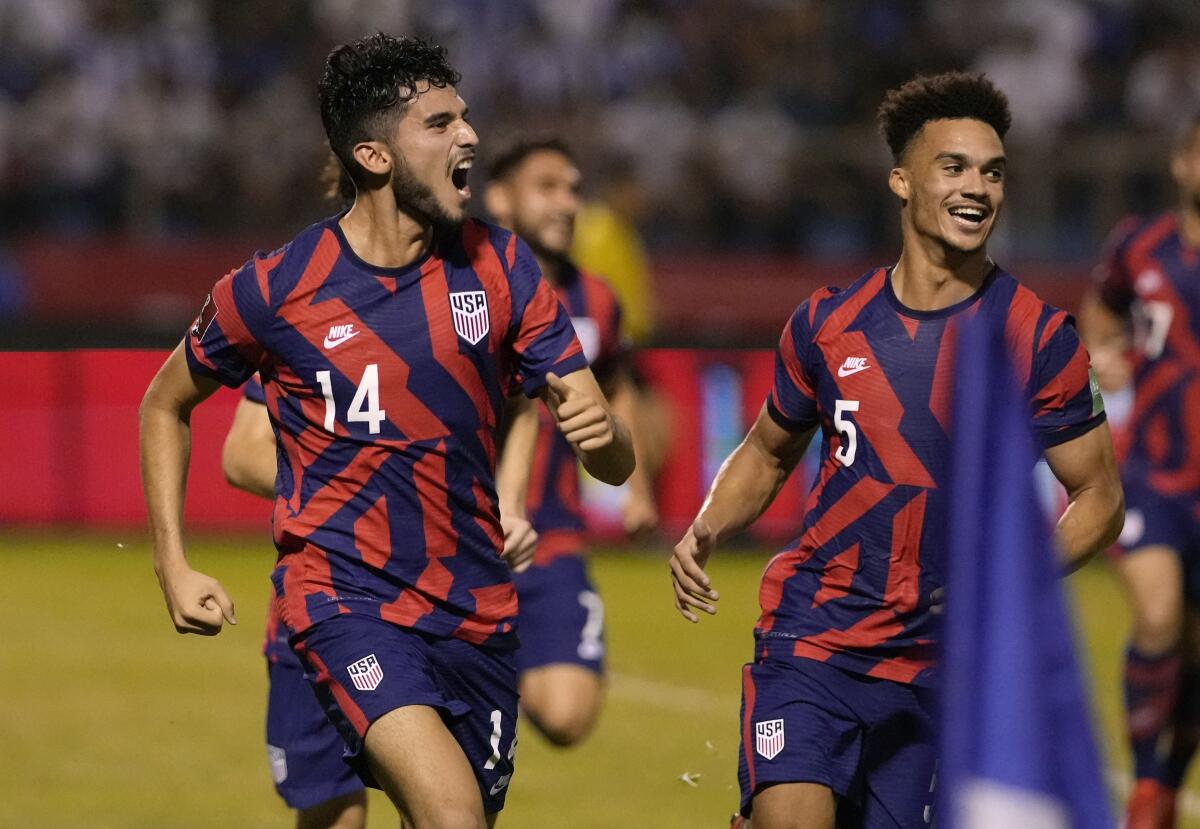
- Share via
SAN PEDRO SULA, Honduras — The first World Cup qualifying window didn’t go as planned for the U.S. national team. But it ended a lot better than a lot of people thought it would.
The Americans drew two games they could have won, lost three starters to injury and another to COVID-19 and saw a one-time locker room leader get suspended and sent home for repeated violations of team protocols.
But they ended the three-match, eight-day ordeal by rallying for an improbable 4-1 win over Honduras that gives their qualifying chances, if not their confidence, a boost.
The goals, all in the second half, came from Antonee Robinson, Ricardo Pepi, Brenden Aaronson and Sebastian Lletget, erasing a 1-0 deficit Honduras built on Brayan Mora’s diving header midway through the first half.
At halftime, the U.S. looked ragged if not finished. Forty-five minutes later, it trailed only Mexico in the qualifying standings. And the win, accomplished with the youngest starting lineup in a qualifier in the modern era, is the freshest memory the players will take with them when they begin returning to their club teams Friday.
“You always try to go home with a good feeling,” coach Gregg Berhalter said before the game. “Every time we play, even if the result doesn’t go our way, we’re trying to pull positives from the game.”
Here are a few positive things Berhalter can pull from the Americans’ first road victory in CONCACAF qualifying in eight years, and their first victory in Honduras since 2009:
The U.S. men’s national team has had urine, batteries and animal heads tossed its way when it played CONCACAF World Cup qualifiers on the road in the past and will be tested again Thursday versus Honduras.
- Despite the slow start in the tournament the U.S., unbeaten at 1-0-2, has five points through three games and is tied with Canada and Panama for second in the qualifying table on goal differential. It has to finish in the top three among eight teams to reach next year’s World Cup, a tournament the U.S. missed three years ago.
- In the October qualifying window the U.S. will play two of its three games at home, where it has lost just three of 31 qualifiers since 1989. And with COVID expanding the qualifying tournament to 14 games, the U.S. has plenty of time to make up lost ground. While the previous hexagonal format ended after 10 games, the U.S. has 11 matches remaining this time, six of them at home.
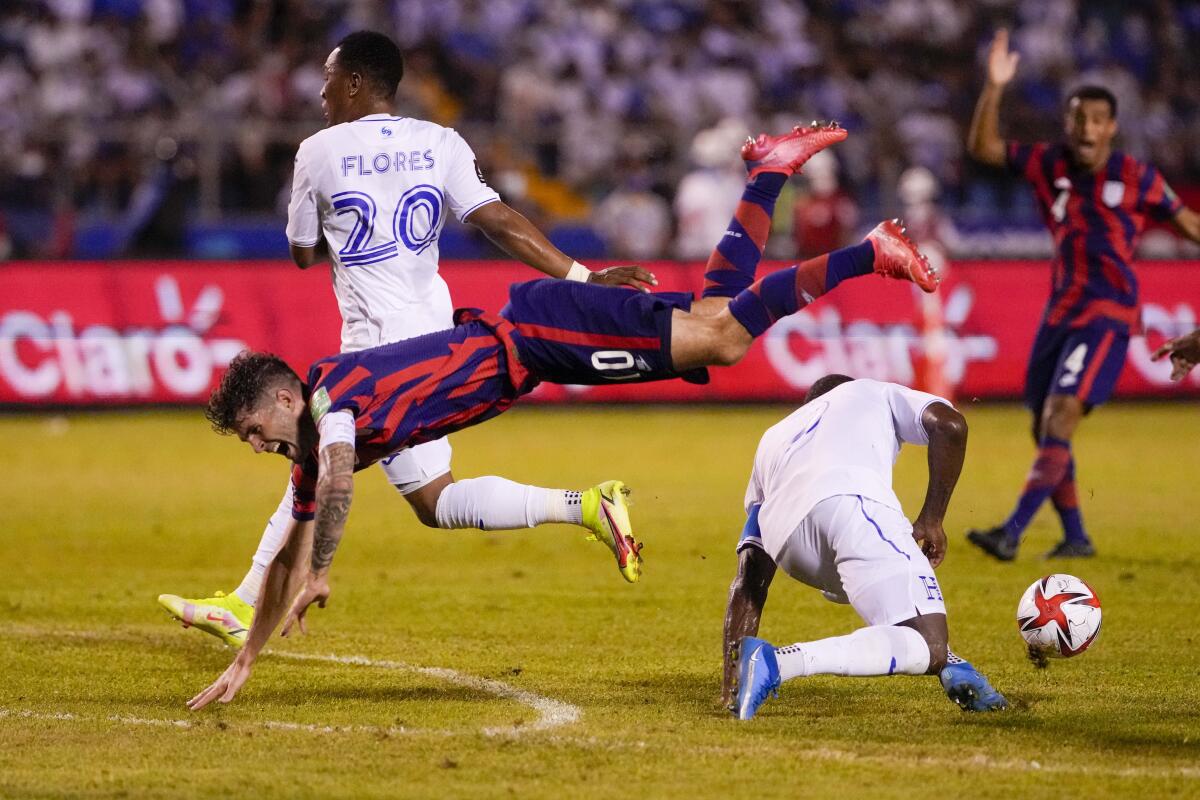
- Then there’s midfielder Weston McKennie, the player sent back to his club in Italy as punishment for what ESPN reported were multiple violations of the national team’s COVID-19 protocols. He could be back next month, said Berhalter.
That remains to be seen. But with McKennie unavailable, Berhalter gave Pepi, 18, his national team debut while George Bello, 19, James Sands, 21, and Mark McKenzie, 22, made their qualifying debuts. The lineup had an average age of 23 years 85 days and 17 caps, making it the equal-youngest in a competitive game in U.S. history.
“We needed to give these guys that experience. They needed to see what these [qualifying] games are like, because they’re completely different games,” Berhalter said. “It’s a different animal than we’re used to. This whole window was great for this group.
“To cap it off with a win was important. And also to come back in the way we did.”
The mistake-prone youngsters showed just how steep that learning curve can be in the first half, getting outshot 11-4 and failing to put a try on target, allowing Honduras to go in front in the 27th minute on Mora’s header. It marked the first time the U.S. has trailed since the Nations League final with Mexico three months ago.
Things changed after the intermission, though, with Robinson coming on for Bello — one of three changes Berhalter made at halftime — and evening the score three minutes later, celebrating his first international goal with a backflip.
While the U.S. men’s national team has plenty of time to earn World Cup qualifying wins, it’s lack of scoring options and player shortages are a major concern.
Pepi, a dual national who didn’t commit to the U.S. over Mexico until last month, then put the U.S. in front to stay in the 75th minute with his first U.S. goal, which may prove to be the score that saved the team’s qualifying campaign.
“I feel like I’ve worked hard for all these moments, I feel like I’ve prepared myself on and off the field for these moments,” said Pepi, the second-youngest American, after Christian Pulisic, to play in a World Cup qualifier.
Pepi said Berhalter told him on the charter flight to Honduras that he would be starting, giving him time to alert friends and family in El Paso.
“I was ready for the opportunity,” he said. “It was very special. I was preparing for the moment ... .”
But it wasn’t until the final whistle that he realized exactly what his goal had accomplished.
“It was after the game that I got all the emotions,” Pepi said.
The 20-year-old Aaronson and the Galaxy’s Lletget, both second-half substitutes, then put the game away with Aaronson getting his second goal in as many games in the 86th minute off an assist from Pepi and Lletget scoring three minutes into stoppage time.
Lletget’s goal was his second in World Cup qualifying, both against Honduras.
For Pulisic, the U.S. captain who was on the bench for the final three goals after sustaining an ankle injury, the win ended a complicated, frustrating and emotional week. But the key word in that sentence is ended.
“We were pretty much just forced to look past it, which we have,” he said. “And now we just have to focus on what’s ahead.
“There’s no doubt within this team. We’re a confident bunch of guys.”
They’ll get a chance to prove that again in October.

